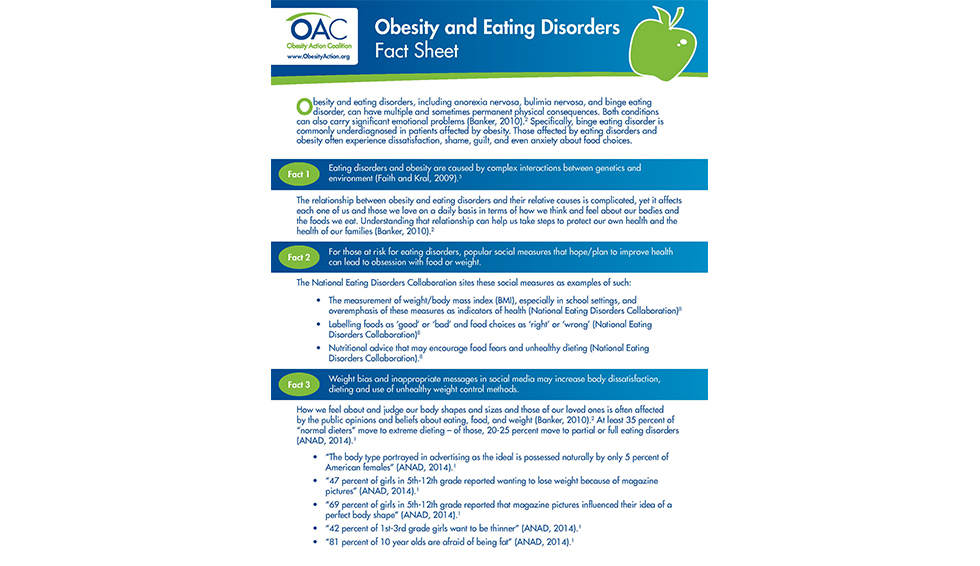Obesity and Eating Disorders Fact Sheet

Obesity and eating disorders, including anorexia nervosa, bulimia nervosa, and binge eating disorder, can have multiple and sometimes permanent physical consequences. Both conditions can also carry significant emotional problems (Banker, 2010).2 Specifically, binge eating disorder is commonly underdiagnosed in patients affected by obesity. Those affected by eating disorders and obesity often experience dissatisfaction, shame, guilt, and even anxiety about food choices.
Eating disorders and obesity are caused by complex interactions between genetics and environment (Faith and Kral, 2009).
The relationship between obesity and eating disorders and their relative causes is complicated, yet it affects each one of us and those we love on a daily basis in terms of how we think and feel about our bodies and the foods we eat. Understanding that relationship can help us take steps to protect our own health and the health of our families (Banker, 2010).
For those at risk for eating disorders, popular social measures that hope/plan to improve health can lead to obsession with food or weight.
The National Eating Disorders Collaboration sites these social measures as examples of such:
- The measurement of weight/body mass index (BMI), especially in school settings, and overemphasis of these measures as indicators of health (National Eating Disorders Collaboration)
- Labelling foods as ‘good’ or ‘bad’ and food choices as ‘right’ or ‘wrong’ (National Eating Disorders Collaboration)
- Nutritional advice that may encourage food fears and unhealthy dieting (National Eating Disorders Collaboration).
Weight bias and inappropriate messages in social media may increase body dissatisfaction, dieting and use of unhealthy weight control methods.
How we feel about and judge our body shapes and sizes and those of our loved ones is often affected by the public opinions and beliefs about eating, food, and weight (Banker, 2010).2 At least 35 percent of “normal dieters” move to extreme dieting – of those, 20-25 percent move to partial or full eating disorders (ANAD, 2014).
- “The body type portrayed in advertising as the ideal is possessed naturally by only 5 percent of American females” (ANAD, 2014).
- “47 percent of girls in 5th-12th grade reported wanting to lose weight because of magazine pictures” (ANAD, 2014).
- “69 percent of girls in 5th-12th grade reported that magazine pictures influenced their idea of a perfect body shape” (ANAD, 2014).
- “42 percent of 1st-3rd grade girls want to be thinner” (ANAD, 2014).1 • “81 percent of 10 year olds are afraid of being fat” (ANAD, 2014).
Those affected by eating disorders and obesity can experience a number of physical and/or consequences, including, but not limited to: (NEDA, nd) (CDC, 2013)
- High BP
- High cholesterol
- Type 2 diabetes
- Heart disease
- Gallbladder disease
- Amenorrhea
- InfertilityCancer
- Arthritis
- Premature death
- Sleep disturbances
- Depression
- Anxiety
- High Blood Pressure
by Sarah Muntel, RD Summer 2024 Here comes summer with sunshine, relaxation and lots of fun! As…
Read Articleby Nina Crowley, PhD, RD Summer 2024 Before we talk about body composition, it’s important to know…
Read Articleby Greer Raggio, PhD, MPH Summer 2024 When we think about grief, we often imagine someone coping…
Read Article







